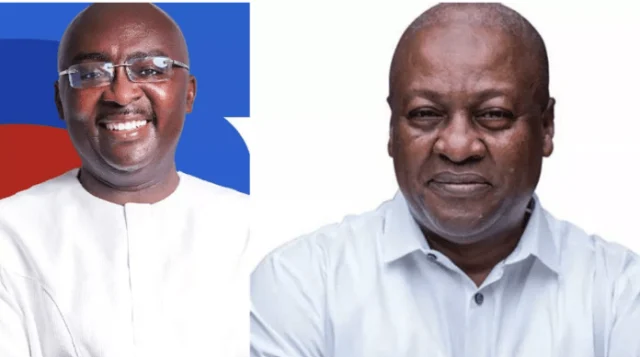
A recent survey has revealed that the governing New Patriotic (NPP), Dr. Mahamudu Bawumia and John Dramani Mahama of the opposition National Democratic Congress are currently neck-and-neck with each currently likely to garner 46.3% of voter support in the 2024 presidential election.
The survey, conducted by some researchers from the University of Ghana, Legon, in August, also disclosed that while the race is remarkably close, Dr. Bawumia is likely to surpass Mr. Mahama if he presents compelling and effective policies the electorate are demanding, especially with high momentum on his side.
A total of 28,935 respondents across all 276 constituencies in the country were surveyed, using a multi-stage sampling technique to ensure broad representation.
The survey included diverse demographic variables such as gender, age, profession, and other socio-economic factors, ensuring that the results accurately reflect the views of the Ghanaian electorate.
It further revealed that former President Mahama was seen as “currently more visible in the constituencies, but the study identified that NPP’s Vice-President Mahamudu Bawumia is popular among the Christian voter population, while the NDC’s Mahama is popular among Muslim voters, including the Zongos.”
High voter turnout
Meanwhile, this year’s election is likely to see a high voter turnout, with approximately 9 out of every 10 (87%) respondents indicating their readiness to participate in the December 2024 general elections.
Out of these, 80% have already decided which political party they will vote for and do not intend to change their choice.
Across the regions, Bono (13.7%), Oti (12.1%), and Greater Accra (10.4%) have the highest proportion of undecided voters.
Only about 1 out of every 10 respondents (9%) indicated that they would not participate in the upcoming election. Among those who do not intend to vote, the majority (77%) cite dissatisfaction with politicians as the primary reason, while 7% cite the day of elections being a holy Sabbath.
Those citing the Sabbath as a reason for not voting are concentrated in the Western (16.6%), Bono (15.1%), Ahafo (11.2%), Western North (10.6%), and Ashanti (9%) regions.
With the two major political parties – the NPP and the NDC, crisscrossing the country and battling for votes, such high turnout is expected to have considerable impact on the fortunes of the two parties, especially if they are able to galvanise their base and also attract floating voters.
Outcomes
The findings showed that 4.4 per cent of the electorate were likely to vote for other political parties and independent candidates, a situation that could push the elections to a run-off, the study found out.
“A considerable three per cent are yet to decide their preference. The smaller parties and independent candidates shared 4.4 per cent of the votes. This means the smaller parties have the capacity to push the elections to a run-off. Neither the NDC nor NPP can win the entire undecided component of electorate,” the survey pointed out.
Again, the study concluded that Nana Kwame Bediako, the leader of the New Force Movement, is expected to perform considerably well due to his popularity among the youthful voters, while the flag bearer of the Movement for Change, Alan Kyerematen, and the other political parties were also working hard to become part of the voting decision of the electorate.
Popularity
Other findings of the study showed that the although 44 per cent of the respondents liked the NPP government, with 43 per cent saying the NPP had the capacity to deliver on its campaign promises, 47 per cent said the NPP government had failed to implement most of its policies.
With the NDC, 39 per cent of the respondents said the party had done well in opposition since 2021, rating its performance as “good”, with 21 per cent saying it was “very good”, 10 per cent rating the party as “excellent’, 20 per cent scoring as “bad” and 10 per cent saying the party was “very bad” in opposition.
Running mate
With regard to value the running mates of the two major political parties bring to the table, the survey showed that the electorate were not really influenced in the voting decisions based on the running mates.
With regard to the running mate of the NDC, Prof. Naana Jane Opoku Agyemang, 75 per cent of the respondents said her choice as running would not affect their voting decisions, while 79 per cent of the respondents said the choice of Dr Mathew Opoku Prempeh would not affect how they would vote.
“Starting with Prof. Naana Jane Opoku Agyemang, majority (75 per cent) of the respondents indicated that her choice as a running mate for the NDC would not affect their voting decision. However, 16 per cent is ready to vote for the NDC because of her – with a considerable proportion of eight per cent ready to vote against the NDC because of her,” the study posted.
“In the case of Dr Mathew Opoku Prempeh, majority (79 per cent) of respondents also indicated that his choice as a running mate for the NPP would not affect their voting decision. A considerable proportion of nine per cent is, however, ready to vote against the NPP because of him,” the survey concluded.








































